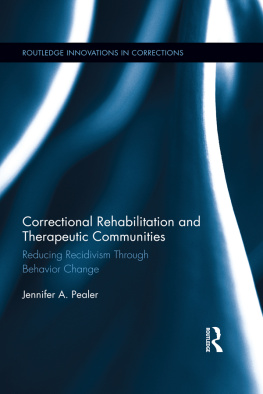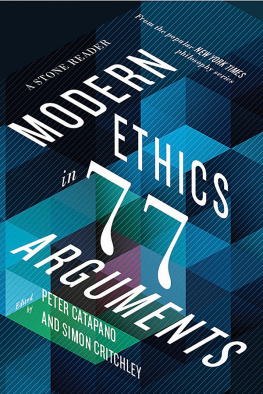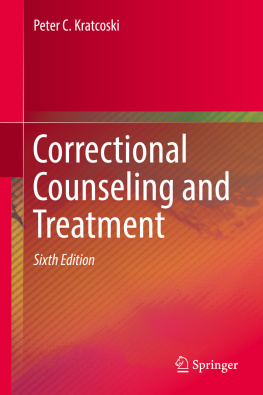First published 2005 by Transaction Publishers
Published 2017 by Routledge
2 Park Square, Milton Park, Abingdon, Oxon 0X14 4RN
711 Third Avenue, New York, NY 10017, USA
Routledge is an imprint of the Taylor & Francis Group, an informa business
Copyright 1970 by Peter G. Garabedian and Don C. Gibbons. New material this edition copyright 2005 by Taylor & Francis
All rights reserved. No part of this book may be reprinted or reproduced or utilised in any form or by any electronic, mechanical, or other means, now known or hereafter invented, including photocopying and recording, or in any information storage or retrieval system, without permission in writing from the publishers.
Notice:
Product or corporate names may be trademarks or registered trademarks, and are used only for identification and explanation without intent to infringe.
Library of Congress Catalog Number: 2005048525
Library of Congress Cataloging-in-Publication Data
Becoming delinquent: young offenders and the correctional process / Peter
G. Garabedian and Don C. Gibbons, editors ; with a new introduction by David Matza.
p. cm.
Originally published: Chicago : Aldine Pub. Co., 1970.
Includes bibliographical references and index.
ISBN 0-202-30795-6 (pbk.: alk. paper)
1. Juvenile delinquencyUnited States. 2. Juvenile justice, Administration ofUnited States. I. Garabedian, Peter G. II. Gibbons, Don C.
HV9104.B416 2005
364.36973dc22
2005048525
ISBN 13: 978-0-202-30795-4 (pbk)
Contents
Carl Werthman
James F. Short, Jr., and F. Ivan Nye
Fred J. Murphy, Mary M. Shirley and Helen L. Witmer
Robert M. Terry
Irving Piliavin and Scott Briar
James Q.Wilson
Edwin M. Lemert
Regis H. Walther and Shirley D. McCune
Seymour Z. Gross
Yona Cohn
Frank Scarpitti and Richard M.Stephenson
Carl F. Jesness
Thomas G. Eynon and Jon E. Simpson
Howard Parker
James D. McMillin and Peter G. Garabedian
Peter G. Garabedian
Becoming Delinquent is a collection of research essays and articles edited by Peter Garabedian and Don Gibbons on the process by which juveniles are identified or defined delinquent. Many, but not all, of the ideas and research projects were encouraged, funded, or supported by the various federal delinquency studies programs and curriculum development programs focusing on juvenile delinquency during the sixties and guided by precepts and persons associated with the Kennedy-Johnson War on Poverty.
The institutional model organized the various essays and studies published originally in 1970 and now reissued by AldineTransaction.
The collection serves as a valuable resource bringing together many of the best examples of the kinds of ideas and research shaping criminology, sociology, law, social work, psychiatry, and allied professions during the period.
The institutional model hypothesized, researched, refuted, modified, clarified, and explained throughout the book is best conveyed in the subtitle: Young Offenders and the Correctional System. During the periodsay, the middle-sixties to middle seventiesavid discussions occurred among students, professors, researchers, and professionals about the effects of correction. Labeling, stigmatizing, selecting, defining, identifying, societal reaction, signifying, and framing were among the terms used to characterize this newly popular theory or idea regarding the causes of juvenile delinquency.
Nowadays the process pointed to would probably be called framing; the concept was already in use in the sixties, but framing was not as popular as labeling. Erving Goffman, followed by Ken Levi (in Becoming a Hit Man) and others referred to framing when considering how the character of young persons as well as adults was framed by reputations, stereotypes, and perceptions of self and others.
Correctional systems are among the finest examples of the institutionalas suggested in Erving Goffmans essay on total institutions in Asylums.
Most of the studies collected (including Lemerts) found mixed results and tended to modulate the strong formulations of labeling or framing in Howard Beckers Outsiders or Edwin Lemerts Societal Reaction Theory.
Institutional processing theory attained a certain degree of popularity during the sixties and the seventies despite the fact that gross characteristics of class and race did not appear to play a discernable role in selecting or apprehending juveniles in the studies collected. Many of the studies indicated that demeanor or uncooperative juvenile behavior played a role in whether authorities acted in a lenient or punitive manner, but that pure and simple discrimination or bias by race or class was hard to discern in the pattern of punishment or the attitudes expressed by correctional personnel.
Each chapter of this collection is an essay or research seeking to show the process by which identity is formed by an individual being processed, defined, or classified first by family and school and subsequently, if trouble is discovered, through police, juvenile court, probation, and prison. The correctional system interacting with a juvenile defines the delinquent. From the juvenile subjects standpoint, a delinquent character is disclosed, made public.
The process model was critical and considered whether the correctional system was backfiring, doing more harm than good, resulting in blow-back, to use the current political science term (popularized by Chalmers Johnson) for a foreign policy or military alliances that backfire, the unanticipated consequences of social action (coined by Robert Merton many years ago).
Starting with family and school (Werthmans The Function of Social Definitions in the Development of Delinquent Careers) and proceeding to (Short and Nyes Extent of Unrecorded Juvenile Delinquency: Tentative Conclusions and Murphy, Shirley, and Witmers The Incidence of Hidden Delinquency), the reader of Becoming Delinquent is guided through the maze of an institutional system of correction encountering and identifying a juvenile behaving, sometimes, in a delinquent fashion.
Similar questions regarding the juveniles basic character are assessed and defined through the correctional system: from the functioning of control agencies (Terrys Discrimination in the Handling of Juvenile Offenders by Social Control Agencies) to the police (Piliavin and Briars Police Encounters with Juveniles, Wilsons The Police and the Delinquent in Two Cities), and on to juvenile court (Lemerts The Juvenile CourtQuest and Realities, Walther and McCunes Juvenile Court Judges in the United States: Working Styles and Characteristics, Parkers Juvenile Court Actions and Public Response), then on to probation (Grosss The Prehearing Juvenile Report: Probation Officers Conceptions, Cohns Criteria for the Probation Officers Recommendation to the Juvenile Court, Scarpitti and Stephensons A Study of Probation Effectiveness, McMillin and Garabedians Attitudes of Probation Officers Toward Due Process for Juvenile Offenders, and Garabedians Policy Questions in Delinquency Control: Perspectives of Police and Probation Officers), and in the penal institution or training school for delinquents (Jesnesss The Fricot Ranch Study, and Eynon and Simpsons The Boys Perception of Himself in a State Training School For Delinquents).









